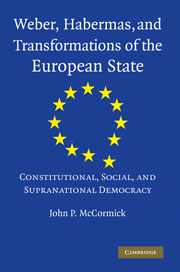Carl Schmitt's Critique of Liberalism
In this first in-depth critical appraisal in English of the writings of Carl Schmitt, John McCormick has furnished philosophers, historians, and political theorists with the most comprehensive account of Schmitt's critique of liberalism available. He examines why technology becomes a rallying cry for both right- and left-wing intellectuals at times when liberalism appears anachronistic, and shows the continuities between Weimar's ideological debates and those of our own age.
- Continuing fascination in Weimar period and fascist political theory will fuel interest in this
- No comparable in-depth study of this problematic figure available
- The book shows why Schmitt's critique of liberalism resonates in today's political culture
- Relates Schmitt to his intellectual forebears and contemporaries (Adorno, Hannah Arendt, Benjamin)
Reviews & endorsements
"...this extremely well researched work is filled with nuanced and intelligent discussions of Schmitt's legal philosophy, his changing attitude towards commissarial and sovereign dictatorship, his relationship to Lukacs, and a host of other topics. All serious students of Schmitt, Weber, the Frankfurt School, neo-Hegelianism, political representation, and the politics of technology will want to read it." American Political Science Review
Product details
June 1999Paperback
9780521664578
368 pages
234 × 156 × 19 mm
0.52kg
Available
Table of Contents
- Introduction
- Part I. Between Critical Theory and Political Existentialism: Schmitt's Confrontation with Technology:
- 1. Antinomies of 'economic-technical thought': attempting to transcend Weber's Categories of Modernity
- 2. Myth as antidote to the 'Age of Neutralizations': Nietszche and cultural conflict as response to technology
- Part II. Liberalism as Technology's Infiltration of Politics:
- 3. Emergency powers
- 4. Representation
- 5. Law
- 6. The state
- Part III. Liberalism and Fascism: Technology and Politics: Epilogue and summary
- Conclusion.









